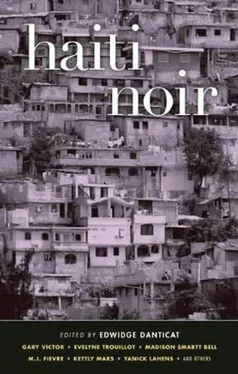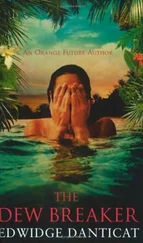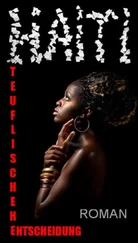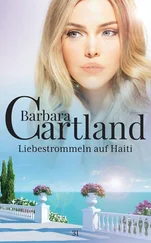Gradually he absorbed the idea that each silvery husk memorialized a martyr of the Revolution who had died on this spot. Doctor Oliver recognized their three names from histories he had read. One had been burned at the stake and the other two broken on the wheel. This information seemed to be borne to him by some sort of voice-over narration, but surely that could not be real. Yet there was a Creole phrase being repeated in an angry monotone: Blan! Pa gade dokiman m! And a person saying it, a long scarecrow who’d detached himself from a niche of shade at the corner of the church and was walking toward Doctor Oliver in a jittery stride, obsessively repeating the words the doctor now understood to mean, Foreigner! Don’t look at my documents!
Doctor Oliver put his sunglasses back on but that did not make him feel any safer. He felt dizzy and sick and unsure of himself. Normally this part of town was perfectly safe, but there were always exceptional days. The week before, an election had gone wrong somehow and since then demonstrators had sealed off the approaches to the town with burning barricades. Though those phenomena existed comfortably far away from the central square, the aggression hurling itself his way now seemed to partake of the same spirit. Doctor Oliver opened his dry mouth and found he could not frame a placating phrase in the right language.
Then someone else had put a hand under his elbow and was steering him gently away, and at the same time speaking to the other man with the calm fluency Doctor Oliver had been unable to summon: Oke monchè, nou prale, nou pa gen pwoblèm ak sa wi?
They turned a corner and there was shade. Immediately Doctor Oliver felt a little better. With his free hand he checked the nearly empty pill bottle in his pants pocket. He was in the company of Charles Morgan, a white American like himself, known to the locals as Charlie Chapo. Their soft tongues elided the “r” and took the crunch out of the consonants, turning Charlie into Shawlie.
“You don’t want to be out in this with no hat,” Charlie Chapo was telling him now. They passed the grilled gateway of the Hotel International. Charlie’s battered Montero was parked across the street, and in the heavy dust on the back window someone had scrawled the name MAGLOIRE . An air conditioner rumbled in a window of the hotel restaurant and Doctor Oliver automatically moved toward the door, but Charlie nudged him past, to the “popular” bar beside it, which catered to the less prosperous locals and had no air-conditioning.
“You’ll get pneumonia in that cold,” Charlie said, “come in here first,” and he assisted Doctor Oliver when he tripped on the step into the popular bar, which was, unusually, stone empty. Charlie rapped on a hatch in the side wall and someone passed two bottles of beer through it, releasing a puff of frigid air before the hatch slapped shut.
Charlie Chapo took off his hat, which was the reason for his sobriquet, and set it on the chest-high counter where both men leaned. It was a nondescript straw hat of the sort the peasants wore, shaped like a Panama and as finely woven, with heavy sweat stains at the brow. Beneath the hat Charlie had, as always, a red bandanna covering his head and tightly knotted at the nape of his neck. The ensemble made it look as if he were affecting Indiana Jones, though if asked Charlie would say that he’d adopted the rig from pictures of the colonial planters and that it worked very well to protect his head-from heat and sun, presumably, though Doctor Oliver also knew that the red head-rag meant something or other among practitioners of Vodou, of whom Charlie Chapo was rumored to be one. At the embassy they sneered that he had “gone native,” which struck Doctor Oliver as peculiarly quaint in the twenty-first century, a line out of Somerset Maugham.
“What’s the good word?” Doctor Oliver said.
Charlie Chapo released a dusty chuckle. “We’re not dead yet.” He drank from his bottle of Prestige and snapped a lighter to a Comme Il Faut cigarette. “Nou lèd men nou la!”
“Have you been out of town?”
“Not possible, monchè. The soulèvman’s still up and running.”
At this, Doctor Oliver’s withdrawal pangs got sharper. “I thought those things were only supposed to last a day.”
“Supposed to,” Charlie said. There was no electricity in the bar, which was shadowy as a cave. Charlie stepped to tip ash through the blazing doorway and took a quick look up and down the street. “Full moon’s coming,” he said. “They’ll start the ceremonies on Morne Calvaire. That might shut it down if it was local but word is those guys on the barricades came up from Port-au-Prince.”
“Who’s running them?”
Charlie shrugged. “There’s a hundred stories.”
“That guy who was after me on the square,” Doctor Oliver began. “He was, I don’t know, more possessive than usual.” Possessed was another word that came to him. As if the whole person was owned, invaded, by the phrase he kept repeating.
“There’s some strange stuff swirling around today.” Charlie leaned forward, pushing his sunglasses up above the dustcrusted rim of his red bandanna, exposing to Doctor Oliver his tired eyes. “They killed La Reine D ’Ayiti, did you know that? In the Place Montarcher.”
“What?” Place Montarcher was a smaller square, only a few blocks uphill from the cathedral. Nothing bad happened there. “In daylight? Who?”
Charlie Chapo was nodding slowly. “I meant to tell you that. Chimè.”
That, Doctor Oliver knew, was the current word for zenglendo or bandits or occasionally lawless persons who might sometimes engage in political thuggery, abruptly materializing, then fading away. Those on the barricades were chimè as well. The literal translation was “chimera.”
“They cut her heart out,” Charlie added.
“Jesus. Why?”
There was a flash behind the bar, where a server had silently appeared, his eyes widening white in the shadows at what Charlie had said.
“Scare the bejabbers out of everybody.” Charlie shrugged.
He had known her, Doctor Oliver realized, this harmless madwoman who’d styled herself the Queen of Haiti and did the stroll from Place Montarcher to the Boulevard de la Mer, capturing whomever she could in tight lassoes of her crazy talk.
“There’s always a sort of big energy buildup,” Charlie Chapo was saying. “Between Pentecost and Trinity-and it releases in the ceremonies. Normally it should. A thing like this, though… it can all start going in the wrong direction.”
“I need to get out of here,” Doctor Oliver said. The demonstrations had cut him off from the airport, which was probably out of service anyway; he was meant to have flown to the States three days before.
“Right,” said Charlie, “it’s inconvenient for me too.”
Doctor Oliver touched the bottle in his pocket. Two pills left and why was he saving them? So there would be that much between him and the void. He resolved to speak about this to Charlie Chapo, who was sometimes something of a fixer.
“Charles. I need to…” A delicate matter. “Um. Refill a prescription.”
Charlie was looking at him slantwise. “For what?”
“Um.” Too much delicacy and he would not be understood. “Well, it’s Dilaudid. But I can substitute! OxyContin, Percocet even…”
“Or heroin would do.”
“Yes,” replied Doctor Oliver, naked now, and almost unashamed. “It would.”
But Charlie Chapo was shaking his head. “There’s coke around,” he said. “There’s even crack, believe it or not… but what you’re after-it’s not obvious.”
“At the hospital maybe?”
He felt Charlie Chapo withdraw a little, though his body had not moved. “You do the medical missions, right? So you know, they never have enough painkillers for…”
Читать дальше












